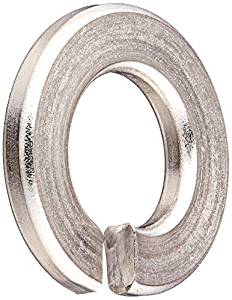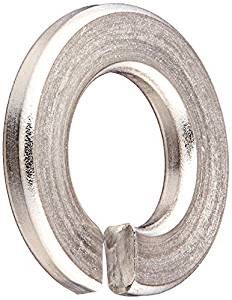Are you working on an outdoor project and need a lock washer for your fasteners? You should get a lock washer. Go through our lock washer review to learn more about the different types.
Since I was young, I have always enjoyed living next to the sea. When I was old enough to buy a small boat, I did not hesitate. I had the time of my life every time I went out sailing. The only challenge I experienced was the maintenance of some of the parts. My nuts and bolts would keep on loosening, and I needed a permanent solution to this problem. My research about lock washers helped me find the ideal type to tighten them.
What are the specifications of a lock washer?
| Type | Split lock washer |
| Material | Stainless steel |
| Weight | 4 ounces |
| Dimensions | 2.4 × 2.7 × 1.6 inches |
| Call to action | Check price here |
Lock washer review
Nuts and bolts sometimes loosen after extended use due to things such as friction and vibration. You should look for a lock washer that can tighten the two and prevent a leak. A lock washer is a non-metal or metal material that you can use on a fastener to boost its performance. You can also use a lock washer to disperse the pressure which is exerted on a joint or hole.
The dimensions of lock washers come in metric units. Before purchasing one, you need to know the size that can fit your specific application. If you are not familiar with the size, the manufacturer can also customize your lock washer so that it gives you proper service. Lock washers also follow SAE, ANSI and USS sizes.
Lock washer review types
Your need should help you choose the right kind of lock washer. They come in the different forms discussed below.
Split lock
Some people call this type helical spring lock washers. Split lock washers are produced out of a spring coil. The lock washer is designed to squish flat between the mounting surface and the nut during tightening. Split lock washers feature sharp edges which should dig into your nut as well as the mounting surface to prevent the surface from rotating.
Sealing washers
These contain a silicone rubber attached to the steel part. You can use sealing washers with bolts, screws, and nuts. They are ideal for all your sealing needs. The manufacturers design these washers to deliver locking and sealing simultaneously. A sealing washer can prevent your fastener from slipping or turning due to loosening.
Internal tooth
If you have a fastener that contains a small head you can use an internal tooth lock washer to secure it in place. This lock washer features teeth on the inner dimension and is smooth on the outer part. The inner teeth are designed to bite into the surface so that the bolt head does not loosen on the screw. The teeth can also absorb vibration or shock.
External tooth
A fastener with a big head needs an external tooth lock washer. It contains teeth on the outer dimension and is smooth on its inner dimension. The teeth are meant to bite into the surface that you put it on. It has a cylindrical hole in the middle part. When you fasten the head into the hole, you allow the external teeth to grab the surface to boost efficiency.
Pros
- They can minimize surface pressure on a soft material
- The right lock washer can reduce the risk of loosening caused by embedment
- Most of them are made from high-quality materials that prevent further corrosion of surfaces
Cons
- Some of them may not be effective on heat treated fasteners
- Finding the right size for different applications can be challenging
FAQs
Yes. They prevent bolts and nuts from turning, loosening and slipping due to vibration. Though there are of different types, they all use one concept which is to hold a bolt and nut in place.
Should I also get a flat washer with the lock washer?
Though these two work together, they are not the same. A flat washer is designed to spread the force of tightening your nut through increasing the surface area. The lock washer goes on the nut side of your fastener.
Why do my bolts keep on getting loose?
Bolt loosening is often a result of vibration. The off torque can rotate your screw and make it lose. Friction under your bolt and nut can also make the two loose. You need a lock washer to fix this.
How can I remove a lock from the tooth washer?
Use an adjustable wrench to remove your nut from the bolt then pull off the lock washer with a flat head screwdriver.
Conclusion
It is unfortunate that many people choose the wrong type of lock washer for certain needs. Before picking any lock washer in the market, you should try to understand how each type works to avoid increasing the risk of loosening in a joint. From my lock washer review, I was able to cover most of the types in the market and discover how each type works. I even found the best lock washer to tighten the nuts and bolts on my boat.


